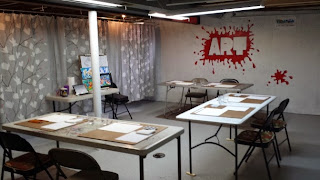My instruction philosophy on Ages, Arts
and Crafts, and Results.
Every artist, art teacher, instructor
(and every parent) has different ideas concerning these things, and
there is something to learn from them all. Here is my 2 cents.
Ages:
From my experience as an artist/student
and mom/instructor to mine and many other kids, I feel there are three general
stages for younger kids learning art. Obviously every kid reaches
each stage at their own pace. At a very early (preschool +) age it is
just about getting your hands on the material. Total
experimentation. Mushing the colors around, getting your hands
dirty, learning motor skills ( using scissors etc). The goal is the
experience and not at all the end result.
In the middle elementary age years it
is a great time to learn processes in a general sense, getting more
comfortable with the tools, introduction to a wide range of styles
and techniques. I think art at this age should keep kids interest
and be FUN! The goal at this stage is that the kids like their art
and enjoy the experience and relate to creativity as a positive
thing.
Once a kid gets to the stage where they
are losing interest in “kid art” or are starting to judge their
own works as being immature or “not realistic” then they are
ready for more difficult projects, learning the actual technical
skills they need to reach their desired goals. This is the stage
where instruction needs to be coupled with outside practice (and
practice, practice, practice), which is true of any skill. In my
experience, this is the stage that if they are interested they are
absolutely up to and ready for the challenge or if the practice of
art is not their passion, they may stop “doing art” as their
skills and their expectations no longer match. At what exact age
each kid gets to these stages is completely individual.
Arts and Crafts:
Most of the elementary aged classes I
offer fall into categories I think in general of as “processes”
or “art appreciation”.
The “process” classes are about
introducing (or practicing, building on prior knowledge) certain
processes or method such as watercolor resist, collage, simple one
point perspective, basic shading etc...There is a project that kids
can follow along exactly to learn the process. Kids can also go off
script if they feel comfortable to make individual creative choices
within that method or process.
The “art appreciation” classes are
about introducing (or reintroducing) kids to a particular artist, art
movement or even a particular work of art. There is again a project
based on that work or artist that the kids can follow exactly or
taking inspiration from the project to make some independent creative
choices.
Keeping in mind that these are
typically only 60 minute classes with different kids each time vs. an
extended or “academy” camp or course where they and I would be
able to build on a process or skill over and over.
In my short time with them, I try to
have a little of 'the best of both worlds': A specific planned
project, a very much craft like and comfortable project to follow
along to learn the process or method, but I also allow for, and
encourage, those who want to go “off script” and I encourage the
creativity and independent choices that makes the project ART when
kids are comfortable (and excited!) about that.
RESULTS:
My goal is for the child to have a
meaningful experience over producing a specific result (which may or
may not happen). If your goal, as the parents, is for a project that
looks “just so” or exactly matches the example, please consider...
Making creative choices (“I'm going
to use blue instead of yellow for the sun!” "What if I replace a flower with a heart shape?") can have mixed results
as far as the finished product. I always tell my own kids that they
learn much more from what they got wrong than from what they got
right. And in the classes that I typically do, going off script is
where the critical thinking happens. I, as the instructor, have a
finished product as an example and my choice of color works, if a kid
chooses a color that differs from mine and it doesn't work... THAT is
learning!! Copying is very valuable when learning, but
experimentation is no less valuable.

 In this series students will work on drawing skills and honing technique. We will work on exercises to begin to learn how to SEE like an artist, we will cover elements such as FORM, we will talk materials, composition and more!
In this series students will work on drawing skills and honing technique. We will work on exercises to begin to learn how to SEE like an artist, we will cover elements such as FORM, we will talk materials, composition and more!









